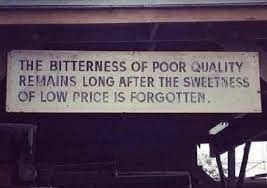27th Jan, 2022
I recently spoke with an architect friend about the problems one of his clients was going through. While they had originally interviewed my friend for the project, they wanted someone right away and thought he was too expensive for what they needed. Unfortunately, they currently find themselves buried in costly problems that he’s now solving for them with rebuilding and reworking.
Was this a poor choice or just bad luck? If we play out the same scenario 100 times — where we rush through the selection of a consultant, picking the cheapest immediately available option — how many times do you think it ends poorly? 80%? 90%? 95%?
In economics, this is called ‘False Economy’, i.e. an action that saves money at the beginning but which, over a longer period of time, results in more money being spent or wasted than being saved.
Some examples of false economy include, Purchasing cheaper products that don’t last as long or may require more maintenance than the more expensive alternatives, like buying cheap shoes, cheap paint, cheap automobiles, cheap appliances etc.
One way to visualize this is through the lessons from billiards. We become so focused on making the first shot that we fail to consider how we position the ball for the next shot. When we go to take the next shot, it’s harder than it had to be.
Consider a few simple ways we put ourselves in a bad position.
We over leverage our business. Everything works great until it doesn’t. When things inevitably change, we find ourselves ill-positioned. What seemed like an advantage becomes a nightmare.
We try to save money in the wrong places. We invest in an FDR assuming it to be low risk and incur the biggest risk of losing the purchasing power of money and not achieving the financial goal.
We balk at the fees of a specialist senior lawyer with years of relevant experience and opt for an ordinary hour lawyer who says the right things. Inevitably, we find ourselves paying for them to learn the lessons that command the heavy fees of a specialist.
We do the same when it comes to purchases. Often, we opt for the ‘cheaper’ option only to realize our mistakes. As the saying goes, buy it right or buy it twice. Cheaper in the moment rarely works out to cheaper overall.
We win the moment at the cost of the decade. Examples of this are everywhere. For example, we skip necessary maintenance to spend less, we monetize buffers and margins of safety. In the process, the smallest shock can cause massive damage.
We fail to take care of ourselves. We don’t eat healthy, sleep right, or exercise enough. When problems come, we’re ill-positioned to deal with them.
We try to save time. We cut corners on a job and cringe when we have to fix our mistakes.
Being in a position to capitalize when times are bad requires doing different things when times are good. This goes against human nature — we don’t want to look like an idiot by doing contrarian stuff when times are good even if doing so offers an unstoppable advantage when times eventually get tough.
Good times eventually come to an end. As Warren Buffett says, “Only when the tide goes out, do you discover who’s been swimming naked.”
The main lesson here is to always put yourself in the best position possible no matter the future conditions. Not only does this mean avoiding costly problems, but it also means putting yourself in a position to perpetually play offense.
Brilliance might appear to win in the moment, but positioning wins in the end.
Sun Tzu said it right when he proclaimed, “Every battle is won before it’s ever fought.”
This lesson goes beyond war.
Don’t fall into the lure of the ‘False Economy’ and stay blessed forever.

